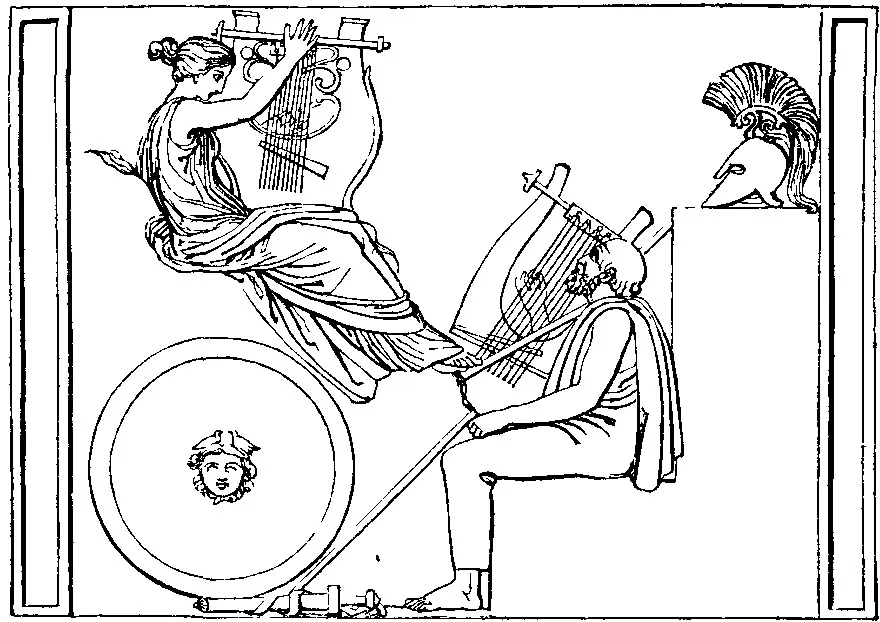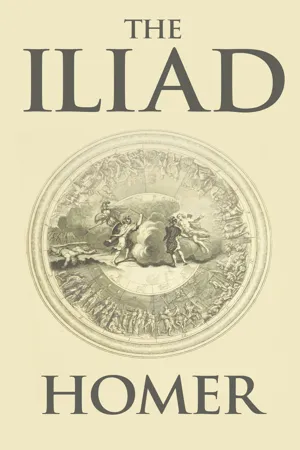![]()
BOOK 1.
ARGUMENT.40
THE CONTENTION OF ACHILLES AND AGAMEMNON.
In the war of Troy, the Greeks having sacked some of the neighbouring towns, and taken from thence two beautiful captives, Chryseis and Briseis, allotted the first to Agamemnon, and the last to Achilles. Chryses, the father of Chryseis, and priest of Apollo, comes to the Grecian camp to ransom her; with which the action of the poem opens, in the tenth year of the siege. The priest being refused, and insolently dismissed by Agamemnon, entreats for vengeance from his god; who inflicts a pestilence on the Greeks. Achilles calls a council, and encourages Chalcas to declare the cause of it; who attributes it to the refusal of Chryseis. The king, being obliged to send back his captive, enters into a furious contest with Achilles, which Nestor pacifies; however, as he had the absolute command of the army, he seizes on Briseis in revenge. Achilles in discontent withdraws himself and his forces from the rest of the Greeks; and complaining to Thetis, she supplicates Jupiter to render them sensible of the wrong done to her son, by giving victory to the Trojans. Jupiter, granting her suit, incenses Juno: between whom the debate runs high, till they are reconciled by the address of Vulcan.
The time of two-and-twenty days is taken up in this book: nine during the plague, one in the council and quarrel of the princes, and twelve for Jupiter's stay with the Æthiopians, at whose return Thetis prefers her petition. The scene lies in the Grecian camp, then changes to Chrysa, and lastly to Olympus.
Achilles' wrath, to Greece the direful spring
Of woes unnumber'd, heavenly goddess, sing!
That wrath which hurl'd to Pluto's gloomy reign
The souls of mighty chiefs untimely slain;
Whose limbs unburied on the naked shore,
Devouring dogs and hungry vultures tore.41
Since great Achilles and Atrides strove,
Such was the sovereign doom, and such the will of Jove!42
Declare, O Muse! in what ill-fated hour43
Sprung the fierce strife, from what offended power
Latona's son a dire contagion spread,44
And heap'd the camp with mountains of the dead;
The king of men his reverent priest defied,45
And for the king's offence the people died.
For Chryses sought with costly gifts to gain
His captive daughter from the victor's chain.
Suppliant the venerable father stands;
Apollo's awful ensigns grace his hands
By these he begs; and lowly bending down,
Extends the sceptre and the laurel crown
He sued to all, but chief implored for grace
The brother-kings, of Atreus' royal race46
"Ye kings and warriors! may your vows be crown'd,
And Troy's proud walls lie level with the ground.
May Jove restore you when your toils are o'er
Safe to the pleasures of your native shore.
But, oh! relieve a wretched parent's pain,
And give Chryseis to these arms again;
If mercy fail, yet let my presents move,
And dread avenging Phoebus, son of Jove."
The Greeks in shouts their joint assent declare,
The priest to reverence, and release the fair.
Not so Atrides; he, with kingly pride,
Repulsed the sacred sire, and thus replied:
"Hence on thy life, and fly these hostile plains,
Nor ask, presumptuous, what the king detains
Hence, with thy laurel crown, and golden rod,
Nor trust too far those ensigns of thy god.
Mine is thy daughter, priest, and shall remain;
And prayers, and tears, and bribes, shall plead in vain;
Till time shall rifle every youthful grace,
And age dismiss her from my cold embrace,
In daily labours of the loom employ'd,
Or doom'd to deck the bed she once enjoy'd
Hence then; to Argos shall the maid retire,
Far from her native soil and weeping sire."
Homer Invoking The Muse.
The trembling priest along the shore return'd,
And in the anguish of a father mourn'd.
Disconsolate, not daring to complain,
Silent he wander'd by the sounding main;
Till, safe at distance, to his god he prays,
The god who darts around the world his rays.
"O Smintheus! sprung from fair Latona's line,47
Thou guardian power of Cilla the divine,48
Thou source of light! whom Tenedos adores,
And whose bright presence gilds thy Chrysa's shores.
If e'er with wreaths I hung thy sacred fane,49
Or fed the flames with fat of oxen slain;
God of the silver bow! thy shafts employ,
Avenge thy servant, and the Greeks destroy."
Thus Chryses pray'd.—the favouring power attends,
And from Olympus' lofty tops descends.
Bent was his bow, the Grecian hearts to wound;50
Fierce as he moved, his silver shafts resound.
Breathing revenge, a sudden night he spread,
And gloomy darkness roll'd about his head.
The fleet in view, he twang'd his deadly bow,
And hissing fly the feather'd fates below.
On mules and dogs the infection first began;51
And last, the vengeful arrows fix'd in man.
For nine long nights, through all the dusky air,
The pyres, thick-flaming, shot a dismal glare.
But ere the tenth revolving day was run,
Inspired by Juno, Thetis' godlike so...





